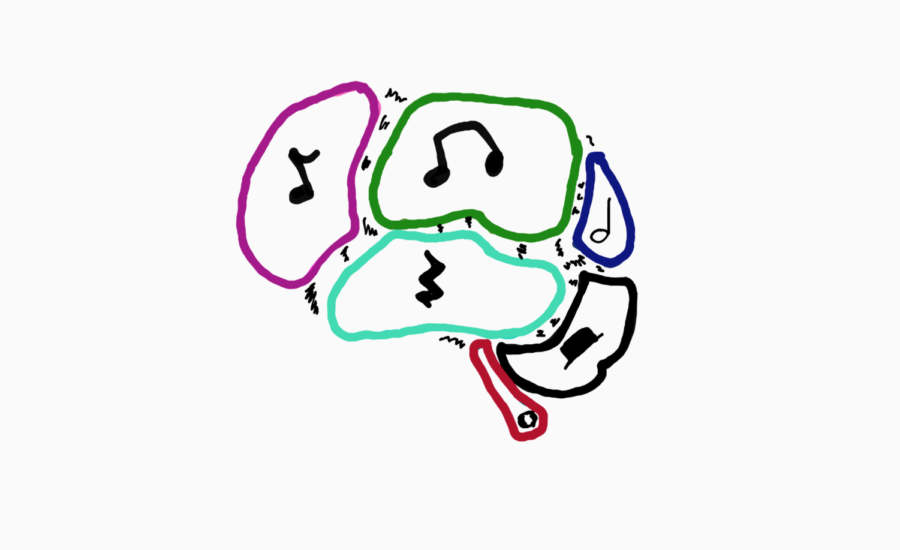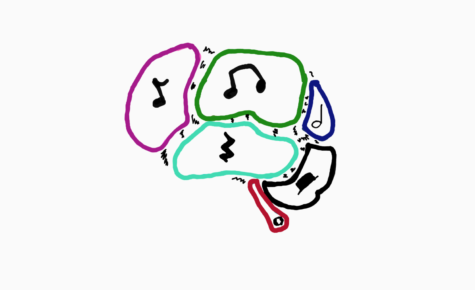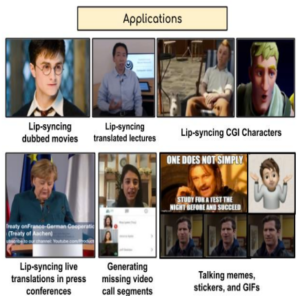Mind The Music
December 19, 2022
Mind the Music
As I write this article, I’m listening to music. The feel of the keys that I hit as I type is more vibrant, as is my focus on the words that they create. The music is overwhelming my sense of hearing, keeping my brain on the right track and not letting it quite drift off into daydreaming. The memories associated with the music are ever present, yet they don’t get in the way of my writing. For at least 30,000 years, humans have been listening to music as they do mundane tasks such as writing, chores, or general work. At some point in those 30,000 years, music evolved alongside us, becoming almost integral to what humans are and altering the brain to the point where we are driven to make music. But what are the results of this alteration of our brain? What does music do to our brains, and are there, if any, correlations between music and other auditory experiences?
“A good song never dies”
Researchers who write for the International Journal of Neuroscience ran an experiment in which they had twelve healthy people listen to: “Bach with and without visual guide (unfamiliar), self-selected familiar music, Gagaku (unfamiliar music) and Chaplin (spoken word),” and recorded the results of which parts of the brain are activated when a specific genre of music is played. “Complex interactions between brain regions, cerebellar regions , superior frontal gyrus and parahippocampal ,… [was] highest for self-selected music,” the scientists explained after they conducted the study. This means the many parts of the brain that interact with memories are activated at an increased rate when listening to music you enjoy. In the same study, the scientist looked into how music may help stroke patients after the fact. “Chronic stroke patients who suffered from resulting hand paralysis showed significant functional improvement using music-supported therapy through increased activation and connectivity between auditory and motor regions measured by fMRI imaging,” explains one of the authors of the study. The findings of this article also show that music can “induce brain plasticity,” essentially meaning music changes the physical properties of the brain and helps it grow and recover.
This correlates with a study done by The Journal of Prevention of Alzheimer’s Disease which resulted in them finding that music “reaches parts of the brain that are less damaged by the disease.” Additionally, a study done by Harvard researchers found that patients with the disease responded greatly when introduced to music that they enjoyed or was recognizable to them. “You have these patients who are essentially sedated, lying down, eyes closed, not able to communicate,” Haddad, a musician and student researcher at Harvard, stated. “And when you play a song that they recognize from their youth, their eyes light up. They’re sitting up, and they’re smiling. It’s just incredible.” In this sense, music can be seen as almost like a time capsule of memories for people in general, not excluding those with mental illnesses.
“Ocean Man, take me by the hand”
All these studies paint the picture that music acts as a key that can unlock parts of the brain that relate to memory and that music can be inherently beneficial to a person’s mind. In correlation, laughter is often quoted to be the best medicine. This idea, combined with music, connects itself with the internet in the form of memes. Reading even a small snippet of lyrics from a song that was, or still is, incredibly popular can bring the entire song to memory, relaying the rest of the lyrics to the forefront of the mind. With this, and the idea of music being like a time capsule, it’s easy to see why scientists and therapists have been more interested in music therapy as a proper treatment rather than pseudoscience.
“Oleander”
Music is incredibly beneficial to the brain, but it can be toxic as well. It’s well known that loud music can be harmful to a person’s hearing, however it’s less known that this damage can also be distributed to the brain. In a study done by the University of Texas at Dallas, they found that excessive exposure to loud music can disrupt the brain’s ability to process speech. This is done when the music damages the hair cells that act as sound receptors in the ear, making speech harder to understand, in turn causing the brain to not be able to process it properly.
The mental influence of music doesn’t end at just physical damage however. According to Embark Behavioral Health, a therapy and mental health clinic, “Certain songs, certain lyrics, [and] certain genres of music are more likely to intensify depression or anxiety, sometimes as much or more as outside stressors and environmental factors.” This doesn’t mean that music inherently causes stress or intensifies negative emotions, rather that listening to music that generally has a negative tone or lyrics can cause your brain to intensify the emotions associated with the lyrics or tone. The opposite is also true, with positive music that has an upbeat tone being able to greatly influence your emotions positively.
“Catabolic Seed”
In the past 30,000 years, humans have listened to music as they worked and did menial tasks, not really paying attention to what it was doing to us. We’ve begun only recently digesting what music does to us, how it affects our brains, moods and even how it can help us heal.We’ve observed that patients with Alzhiemer’s reacting to music strongly and that stroke victims heal faster with its influence. Music’s influence has even been observed in plants, with different genres of music affecting the growth of the plant.
“I’d Rather Sleep”
As I finish writing, music still plays in my head, holding my focus in place and keeping me moving, the feel of the keys becoming duller as I get closer to the end. My mind unravels in place, the music becomes chaotic, and I solemnly embrace the day dream that awaits me at the end of this tunnel.






































































